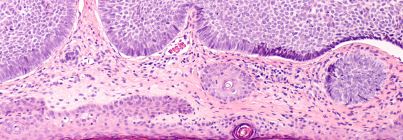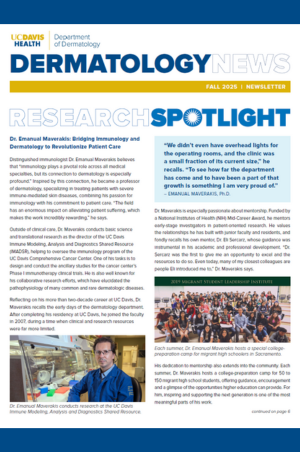Hwang Research Lab
Samuel Hwang, M.D., Ph.D.
Professor and Chair
Department of Dermatology, School of Medicine
University of California, Davis
3301 C St., Suite 1400, Sacramento, CA 95816
Samuel Hwang is a board-certified dermatologist with extensive training as a physician scientist. He has an interest in immunological diseases of the skin, including psoriasis, and in the biology of skin cancers, including melanoma and cutaneous T cell lymphoma. His current research focuses on psoriasis, for which he has an R01 grant from the National Institute of Arthritis and Musculoskeletal and Skin Diseases (NIAMS). Additionally, he is actively engaged in developing new therapeutic approaches for cutaneous T cell lymphoma.
Hwang has a strong track record of investigating how leukocytes migrate to lymph nodes and skin. During his fellowship at UCSF, he studied the role of L-selectin in T cell homing with Steven Rosen, Ph.D., who studies immunology and cancer. It was also at UCSF that Hwang first collaborated successfully with Scott Simon, Ph.D., to investigate L-selectin ligands (ST Hwang et al., JEM, 1996).
As a tenure-track researcher and later senior scientist at the National Institutes of Health, Hwang gained more than 20 years of experience studying leukocyte and cancer cell trafficking. He developed expertise in chemokine receptors such as CCR6 and CXCR4 in both immune and cancer cells, using microfluidic devices such flow chambers to model in vivo leukocyte-endothelial interactions.
Before being appointed as a tenured Chair and Professor of Dermatology at the University of California, Davis in 2016, he was Chair and Thomas Russell Professor of Dermatology at the Medical College of Wisconsin. He has published more than 70 original and review articles in the Journal of Clinical Investigation, Journal of Experimental Medicine, Cancer Research, Journal of Immunology, Journal of Investigative Dermatology, JAMA Dermatology and PNAS.
Samuel Hwang's Research Activities
Hwang and his colleagues at the Medical College of Wisconsin and National Institutes of Health were among the first to conclusively demonstrate the role of CCR6 in the development of psoriasiform dermatitis (analogous to human psoriasis).
Hwang’s team has earned an international reputation in the use of murine models of psoriasis and CTCL for exploration of disease pathogenesis and treatment. He and his lab proved that CCR6 was critical for the trafficking of epidermal gamma-delta T cells to the skin as Th17 effectors in murine models of psoriasis. His lab has also shown that checkpoint inhibitors, specifically PD-1, regulate psoriasiform dermatitis in mice. This work was the first experimental model to replicate a now widely reported side effect of anti-PD-1 mAb treatment for cancer in humans.
For years, Hwang has worked collaboratively with Brian Volkman, Ph.D., on the CXCR4 and CCR6 receptors (Takekoshi et al. Mol. Cancer Ther. 2012 and JID 2013, Getschman et al. PNAS 2017). Together, they have worked to develop specific chemokine receptor antagonists, including the development of a novel CCL20 locked dimeric molecule (CCL20LD) with biased agonist properties, including the inhibition of CCR6-mediated T cell migration and prevention of IL-23-mediated skin inflammation in mice (Getschman et al. PNAS 2017).
Hwang is recognized nationally and internationally for his contributions to basic and translational psoriasis research. He has lectured widely on the topic and has received two Discovery Awards and one Translational Research Award from the National Psoriasis Foundation, as well as an R01 grant from the National Institute of Arthritis and Musculoskeletal and Skin Diseases (NIAMS) for his work on CCR6 in psoriasis.
Selected Research Publications
Singh, TP, Zhang, HH, Hwang, ST, Farber, JM. IL-23- and Imiquimod-Induced Models of Experimental Psoriasis in Mice. Current Protocols in Immunology, e71.
Wang H, Xu Z, Lee BH, Vu S, Hu L, Lee M, Bu D, Cao X, Hwang ST, Yang Y, Zheng J, Lin Z. Gain-of-function mutations in TRPM4 activation gate cause progressive symmetric erythrokeratoderma. Journal of Investigative Dermatology, 139(5): 1089-1097.
Anderson LS, Yu S, Rivara KR, Reynolds MS, Hernandez AA, Wu X, Uang HS, Isseroff RR, Miller LS, Hwang ST, Simon SI. CCR6+ γδ T Cells Home to Skin Wounds and Restore Normal Wound Healing in CCR6-Deficient Mice. Journal of Investigative Dermatology, March (epub).
T. Follansbee; Y. Zhou, X. Wu, J. Delahanty, A. Nguyen, D. Domocos, M. Iodi Carstens, Hwang ST, E. Carstens. Signs of chronic itch in the mouse imiquimod model of psoriasiform dermatitis: sex differences and roles of TRPV1 and TRPA1. Itch, 4(3).
Prasant Kumar Jena, Lili Sheng, Kyle Mcneil, Thinh Q. Chau, Sebastian Yu, Maija Kiuru, Maxwell A. Fung, Samuel T. Hwang, Yu-Jui Yvonne Wan. Long-term Western diet intake leads to dysregulated bile acid signaling and dermatitis with Th2 and Th17 pathway features in mice. Journal of Dermatological Sciences, 95(1): 13-20.
Sebastian Yu, Yanxi Li, Yan Zhou, Taylor Follansbee, Samuel T. Hwang. Immune mediators and therapies for pruritus in atopic dermatitis and psoriasis. Journal of Cutaneous Immunology and Allergy, 2(1): 4-14.
Jagdeo J, Nguyen JK, Ho D, Wang EB, Austin E, Mamalis A, Kaur R, Kraeva E, Schulman JM, Li CS, Hwang ST, Wun T, Maverakis E, Isseroff RR. Safety of light emitting diode-red light on human skin: Two randomized controlled trials. Journal of Biophotonics, 12(9).
Le ST, Merleev AA, Luxardi G, Shimoda M, Adamopoulos IE, Tsoi LC, Wang JZ, Alexanian C, Raychaudhuri SP, Hwang ST, Gudjonsson J, Marusina AI, Maverakis E. 2D Visualization of the Psoriasis Transcriptome Fails to Support the Existence of Dual-Secreting IL-17A/IL-22 Th17 T Cells. Frontiers in Immunology, 10: 589.





